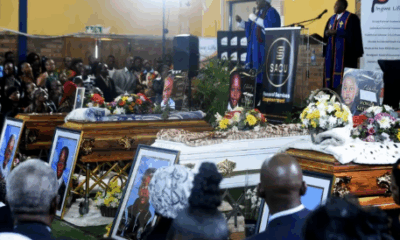News
South Africa’s New Addiction: Why Millions Are Gambling Their Way Through Financial Pain

A Nation Betting Against Itself
When payday arrives in South Africa, the line between survival and chance is becoming alarmingly thin. For millions of citizens, gambling is no longer just a thrill, it’s a desperate lifeline.
According to a sobering new study by Experian and Vault22, nearly half of younger South Africans receiving social grants are spending up to 50% of that money on gambling. For many, the dream of hitting it big has replaced the daily grind of trying to make ends meet.
“Gambling has moved from entertainment to a necessity for those in financial distress,” explains Jaco van Jaarsveldt, head of commercial strategy and innovation at Experian.
With access to over 55 million consumer records and 800,000 real transactions, the data reveals what many have suspected: South Africa’s gambling problem has spiraled into a full-blown social crisis.
The Gamble of the Desperate
The most striking finding? The people who can least afford to gamble are doing it the most. Experian’s analysis shows that some low-income earners, people just scraping by on basic necessities are spending up to 40% of their monthly income on betting.
Even middle-income households are caught in the web, spending 38–50% of their income on gambling, more than they spend on groceries.
And it’s not only the poor. Affluent South Africans, who should be more financially stable, are also hooked spending 10–12% of their income on gambling, though their behaviour is more controlled.
What this reveals is a troubling national truth: from township taverns to urban boardrooms, gambling has become a shared escape from economic pressure.
When Social Grants Become Betting Money
For younger grant recipients, the issue hits especially hard. The study found that up to half of social security payouts from Sassa are being wagered away, undermining one of the state’s most vital poverty-alleviation mechanisms.
That alone, experts warn, “annuls the social compact between the state and the poor.”
Social media users were quick to react with outrage and despair. On X (formerly Twitter), one user wrote, “We can’t blame them entirely, when there’s no hope, even luck feels like a plan.” Another lamented, “We’re gambling with our future, literally.”
A Booming Industry Amid Broken Wallets
South Africans spent an astonishing R1.5 trillion on bets in the last financial year, nearly 20% of GDP, more than what the country spends on education, health, and social development combined.
According to Statistics SA, gambling now makes up 1.6% of all household spending and 55% of all spending on recreation.
The National Gambling Board (NGB) recently reported that R74 billion is being siphoned out of the economy, mostly to online platforms such as Betway and Hollywoodbets. The board welcomed a court ruling declaring it unlawful for bookmakers to offer casino-type games like roulette, but enforcement remains weak.
Both Betway and Hollywoodbets have signalled they will not comply with the directive, highlighting just how lucrative and powerful the online betting sector has become.
Who’s Gambling the Most?
Experian’s segmentation paints a vivid picture of who’s driving the gambling boom:
-
The “Money-Conscious Majority” (42%) – mostly older, cautious spenders placing small bets, averaging R186 a month.
-
“Laboured Living” (24%) – low-income earners making 12 bets monthly, spending about R164 despite barely covering essentials.
-
“Yearning Youth” (15%) – younger workers and students chasing quick wins.
-
“Aspirational Achievers” and “Luxury Living” (14%) – affluent players spending between R3,700 and R5,900 monthly on bets.
Interestingly, Generation X (ages 45–60) has shown the sharpest increase in gambling activity, almost doubling its spend in recent months.
Online gambling now accounts for over 60% of all gambling revenue, a sign of how mobile technology and data access have turbocharged betting culture.
Why Are South Africans Turning to the Tables?
Despite recent interest rate cuts and inflation hovering around 3.4%, financial distress remains widespread. With credit access shrinking and unemployment still high, many turn to gambling as a last-ditch effort to change their fortunes.
“Consumers are under severe financial pressure, and gambling has become a coping mechanism,” says Van Jaarsveldt. But as he points out, “the house always wins.”
Economist Casey Sprake from Anchor Capital warns that without intervention, the gambling surge could undermine household resilience and further entrench inequality.
“Balancing these forces will require updated regulation, stronger financial education, and a renewed focus on responsible gambling as a matter of both social policy and economic stability,” Sprake says.
The Road to Recovery: Can We Stop the Spin?
Experts agree that banning gambling isn’t the answer, it would simply drive it underground. What’s needed, they argue, is mass education about the realities of gambling, stricter regulation of online platforms, and serious financial literacy campaigns.
Yet, as long as the economy fails to deliver opportunity, hope will keep migrating to the betting slip.
South Africa’s gambling crisis is not just a story about addiction, it’s a mirror reflecting a nation’s financial despair. And unless the underlying economic pressures are addressed, the spin of the roulette wheel may continue to be the soundtrack of survival for millions.
{Source: Moneyweb}
Follow Joburg ETC on Facebook, Twitter , TikTok and Instagram
For more News in Johannesburg, visit joburgetc.com


























